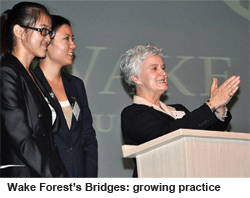Jiao Yizhou, a 17-year-old student at Jiangsu College for International Education in Nanjing, hopes to study environmental engineering at the Georgia Institute of Technology in the US. Like many applicants to university, however, he is anxious about the entrance tests and essays involved. He says he knows that some Chinese students cheat on their applications, persuade teachers to falsify secondary school grades and recommendations, and hire agents who purportedly write admission essays for them. “This kind of thing doesn’t bother me, because I did it the right way and the university officials are not stupid,” Jiao says. “They can tell which applications are real and which are fake.”
But increasing competition for places at universities in the West, in concert with huge year-on-year rises in the number of applicants from China, have left admissions officials worried about what experts say is a widespread and growing practice of cheating. “I don’t mean to caricature this as happening at every school,” says Linda McKinnish Bridges, associate dean of admissions and director of programme development in China for Wake Forest University, a private institution in North Carolina. “But some schools I’ve visited have said to me: ‘We will work with you in any way we can to get these students into the United States’.”
 The problem has become increasingly apparent in recent years. In 2011, research by Nafsa, the Association of International Educators and US educational consulting firm Zinch China found 90 percent of recommendation letters for Chinese applicants to Western universities had been falsified. The two organisations, which conducted interviews with 250 students at top-ranked secondary schools in China, also concluded that 70 percent of admission essays had been written by someone other than the applicants, half of secondary school transcripts had been doctored, and many awards and achievements were fake.
The problem has become increasingly apparent in recent years. In 2011, research by Nafsa, the Association of International Educators and US educational consulting firm Zinch China found 90 percent of recommendation letters for Chinese applicants to Western universities had been falsified. The two organisations, which conducted interviews with 250 students at top-ranked secondary schools in China, also concluded that 70 percent of admission essays had been written by someone other than the applicants, half of secondary school transcripts had been doctored, and many awards and achievements were fake.
“Fraudulent applications are pervasive in China, driven by hypercompetitive parents and aggressive agents” who can earn financial bonuses for getting students into top Western universities, the researchers said. They reported that the phenomenon is driven mostly by middle-class Chinese parents determined to have their children study abroad, 80 percent of whom paid agents to help make it happen. The going rate for this is up to $10,000 (Rs.6 lakh) per student, and as much as double that if the agent can get the student into an institution at the top of the most influential university league tables.
“The cultural norm in China is to consider a 17-year-old not yet capable of managing a decision as important as his or her college education,” states the Zinch and Nafsa report, Fraudulent Chinese Undergraduate Student Applications. Or as Bridges puts it, Chinese parents “have got one child and for that one child you will do everything you can to help (them) get ahead”.
The United Nations Educational, Scientific and Cultural Organisation estimates that 440,000 Chinese citizens are studying abroad, with the US and the UK being the two most popular destinations. China sends nearly 200,000 students a year to the US, almost four times as many as it did at the start of the millennium, with the cohort representing one in four of the international students coming to the country.
Applications from China to Wake Forest have risen from 79 a year to more than 600 over the past five years. Bridges, who speaks fluent Mandarin, visits Chinese secondary schools, and she and other admissions counsellors conduct interviews in English with students via Skype while also having them complete sample writing assignments — all to weed out fraud.
“If the student is very strong, but I have some reservations about their English ability, and if the student does not understand and I have to revert to Mandarin — then that student is not coming to Wake Forest,” she says.
Another survey by Zinch China, unveiled in May, tested the language skills of 25,000 Chinese students hoping to study overseas. It found that two-thirds did not speak English well enough to use it in a classroom discussion. This represents a marked increase on last year, when the English skills of 38 percent were judged to be deficient. The proportion whose language skills are judged to be “strong” fell from 18 percent to 4 percent. Talk of cheating may lead to changes in China, suggests Rob Cochrane, the Australian-born programmes manager at the Jiangsu provincial department of education. “There’s a lot of talk about it at our end. Cheating is not accepted here as being the norm, although lots of people ask me whether it is. The Chinese people are a proud people. They don’t want to be branded pariahs in the education system.”
(Excerpted and adapted from Times Higher Education)























